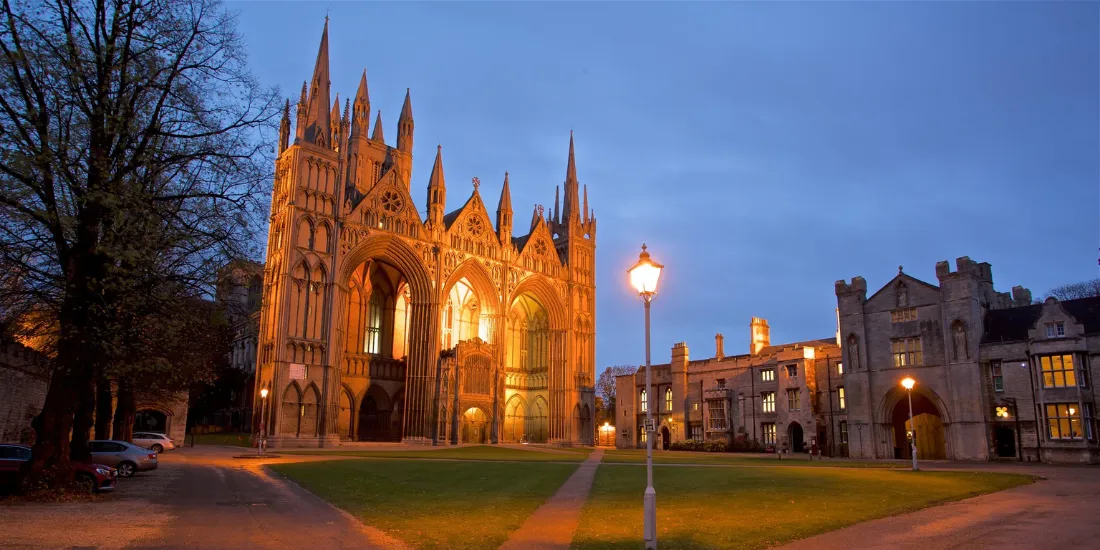
Arriving in Peterborough – It Hits You Different
The first thing that hits you when you arrive in Peterborough, stepping off the train or stumbling out of a coach after 10 hours of travel, isn’t the cold-it’s the quiet stillness of the place.
You hear birds before traffic. You smell a mix of freshly baked bread (something like Greggs or an indie bakery) and that unmistakable countryside breeze-seriously, it’s a thing here. The city is small, manageable, green in a way that’s hard to describe, and kind of charming without even trying.
Trust me-this isn’t flashy London or grungy Manchester. But Peterborough has its own rhythm, its own quiet energy. And if you’re choosing to begin your overseas education in Peterborough, this guide has everything you need-housing, money stuff, internship leads, visas, and how not to get lost on your first bus ride.
Let’s start your 2026 study journey the honest way.
Why Study in Peterborough in 2026?
So, here’s the thing. Peterborough isn’t flashy, and it’s not trying to be. That’s kind of what makes it amazing for international students. It’s affordable, it’s growing, and it’s actually real-the kind of city where you can focus without losing out on things that matter.
And 2026? It’s a great year to be here.
Real reasons that matter:
- The brand-new Anglia Ruskin University Peterborough campus is growing fast in student numbers and resources-it opened in 2022 and is scaling up with student-centered courses designed around employer demand.
- The UK Government’s Towns Fund has invested millions into Peterborough’s regeneration, meaning urban growth = education + employment growth. Simply put: they want students here.
- The UK’s Graduate Route Visa is still on in 2026, meaning you can stay for up to 2 years post-study without job sponsorship to find work or start your career.
- Tuition fees are typically lower than in London-ranging from £13,000–£15,000/year, and living costs are 25–35% cheaper.
Plus, if you’re after a quieter place to settle into student life, Peterborough keeps things simple in the best way. Less noise, less chaos-more studying, cheaper rent, and still only 50 minutes from London by train when you need the rush of the capital.
2026 is also a career-friendly year, especially with the rise of green tech and logistics industries trying to recruit young, tech-literate talent (that’s you, by the way).
Why Is Peterborough Important for International Students?
You won’t find Peterborough on the list of “most famous uni cities,” but don’t be fooled-some of the best opportunities come from cities like this.
Here’s why international students are taking notice:
- Student diversity is growing. At ARU Peterborough, international student enrolment has grown by over 40% year on year since 2022.
- Visa services and student support units are available on campus-including wellbeing services, job mentoring, and English-language help.
- It’s one of the most affordable UK cities for students. And that’s not a tagline. The cost of living in Peterborough is significantly below the national average.
- It’s strategically placed. Nearby cities like Cambridge, Northampton, and Leicester offer job and research opportunities-and are all within an hour away.
- The vibe is more community than competition. Professors are actually available. Campus events are inclusive. You’ll feel part of something.
A girl from Kenya I met in a health science course told me she picked Peterborough because she “wanted a place where she wouldn’t get lost in the crowd.” And that’s exactly it. You’re seen, supported, and given room to grow here.
Top Universities and Colleges in Peterborough
Let’s break down where you could study in Peterborough in 2026. It won’t be a list of 20 institutions-because what matters here is depth, not quantity.
1. ARU Peterborough (Anglia Ruskin University)
- Tuition: ~£13,600/year for most international undergrad programs
- Rankings: Rising fast for employability and teaching satisfaction
- Top Programs: Nursing, computer science, business analytics, construction engineering
- Campus Vibe: Super modern, tight-knit, community-focused. You’ll know your lecturers.
- Location: Right in the heart of the city centre. Walkable from everywhere.
This uni is built with employability in mind-many programs have work experience baked into the curriculum. Great for post-graduation employment.
2. City College Peterborough
- Best for vocational certificates, language courses, and pre-degree diplomas.
- Offers routes into healthcare, social work, IT, and business.
- Tuition is highly affordable (under £9,000/year depending on your course).
Great entry point if you want to ease into the UK education system or build language proficiency first.
3. Peterborough Regional College (now part of Inspire Education Group)
- Offers Apprenticeships, HNDs, and some Level 6 degrees.
- Strong links with local employers in logistics, engineering, and public services.
- Tuition around £8,000–£11,000/year
This one’s ideal if you’re more career-focused or prefer hands-on learning rather than theory-heavy lectures.
4. University Centre Peterborough (UCP)
- Technically affiliated with ARU but worth mentioning separately.
- Offers foundation degrees and Bachelor’s courses in media, performing arts, criminology, and biosciences.
- Relaxed, compact campus-not overwhelming.
UCP is community-heavy and flexible with entry routes for international applicants.
Top Student Accommodation Properties in Peterborough
Let’s talk where you’ll live. Spoiler: you’re not shelling out £1,200/month for a shoebox like in Brighton or London.
1. Unite Students – ARU Peterborough site residences
- Cost: £600–£750/month (ensuite)
- Distance to Campus: 5-minute walk
- Pros: Fully managed, inclusive bills, strong Wi-Fi, on-campus security
- Cons: Slightly more expensive, but worth it for peace of mind
2. Shared Flats in Millfield and New England
- Cost: £350–£550/month (depending on housemates/bills)
- Use SpareRoom or Rightmove to find.
- Often include washers, shared living spaces, decent commute to campus (20 min walk/bus)
3. Private Rooms Near Rivergate or Cathedral Square
- Rent: £500–£600 (bills sometimes included)
- These areas put you close to coffee shops, groceries, and train stations
- Pro tip: Get in early-around April/May-for Sept starts
4. Homestays (Great option for first-time abroad students)
- £450–£650/month including meals
- Bit less independence but more support adapting culturally
Honestly, you’ll find international student accommodation in Peterborough refreshingly affordable-and accessible even if you’re coming on a scholarship budget.
Popular Student Areas in Peterborough
Alright, let’s talk where students actually live. Truth is, Peterborough’s not that big, so most areas are within walking distance or a short bus ride from wherever you’ll study. But some neighborhoods? Total student goldmines.
1. Millfield
- Vibe: Busy, diverse, lots of students and families
- Rent: £400–£550/month (shared flats or houses)
- Distance to ARU Peterborough: 10–15 mins by bus
- Food/Nightlife: International groceries, authentic takeaways, and a few solid pubs
- Pros: Affordable, good deals on rooms with private landlords
- Cons: It’s lively-which is great… unless you’re trying to sleep early
2. New England
- Vibe: Suburban quiet, but still close to shops and decent bus routes
- Rent: £450–£600/month
- Pros: Cleaner, more peaceful, ideal for focus
- Cons: Doesn’t feel “student-y”-depends what you want
3. City Centre / Cathedral Square
- Vibe: Central, walking distance to ARU, restaurants, and night spots
- Rent: Higher-£600–£750/month (private studios and new builds)
- Best For: Students who want everything on their doorstep-libraries, cafes, trains
- Cons: More expensive. Also, it’s loud on weekends. Don’t say I didn’t warn you.
4. Fletton / Woodston
- Vibe: Residential and safe, popular with postgrads
- Rent: £400–£525/month
- Distance: 15-20 mins to ARU by bike or bus
- Best For: Students wanting quiet + affordability
Basically:
- Want cheaper, low-key? Millfield or New England.
- Want walkability and action? City Centre.
- Want to save money and sleep? Try Fletton.
Cost of Living in Peterborough
You’ve probably Googled how much does it cost to study in Peterborough-but every site gives you averages that either over-promise or under-deliver. So here’s the real-life version-based on what actual students spend.
| Expense (Monthly) | Low (£) | Average (£) | High (£) |
| Rent (shared) | £350 | £500 | £750 |
| Utilities & Wi-Fi (if not included) | £40 | £55 | £70 |
| Food (groceries + 1–2 takeaways/week) | £100 | £150 | £250 |
| Transport (bus pass or bike) | £20 | £35 | £60 |
| Phone & SIM | £15 | £25 | £40 |
| Social Life/Night outs | £40 | £80 | £150+ |
| Books / Academic Supplies | £20 | £40 | £80 |
| TOTAL | £585 | £885 | £1,400 |
Tips to manage your budget:
- Cook at home. Aldi, Lidl and Morrisons are your best friends.
- Split grocery hauls with flatmates-you don’t all need separate jars of peanut butter.
- Get a young person’s bus pass or a used bike-saves loads.
- Try the NUS/Totum card for student deals (works at stores, restaurants, even Amazon).
The trap most students fall into?
Buying EVERYTHING new. Seriously, do not buy new kitchenware, duvet sets, or furniture. Facebook Marketplace & local second-hand shops will save you £100+ in that first week alone.
Scholarships and Financial Aid – 2026 Intake
Let’s be real: tuition and living costs can stretch you thin-especially without help from home. But there are scholarship opportunities in Peterborough, if you look early and position your application smartly.
Top Options for International Students
1. ARU Peterborough Merit Scholarships
- Up to £4,000 reduction on tuition for high-achieving international students.
- Based on academic profile + early application.
- Awarded automatically-no extra form required in some cases.
2. Chevening Scholarships (UK-wide postgraduate program)
- Covers full tuition, living costs, and flights.
- Closed for undergrad, but ideal for Master’s applicants.
- Apply by Nov 2025 for 2026 entry.
3. Commonwealth Shared Scholarships
- For citizens of low/middle-income Commonwealth countries
- Also full coverage-competitive, but accessible with compelling aims.
4. University Centre Peterborough Hardship Grants
- Low-key, lesser known, but useful. Usually £500–£1,500.
- Open to students proving unexpected financial difficulty during study.
Where to find more?
- ScholarshipPortal.com
- British Council – Study UK site
- Your country’s education ministry (some offer outbound student funding)
Insider application tip: In your personal statement, always connect your goals to real community impact-not just “I want to study abroad.” Tie it to action.
How to Apply – Step-by-Step for 2026 Entry
Step 1: Research courses & shortlist unis – (Aug–Oct 2025)
- Start early.
- Look at programs that actually fit your career goals.
- Don’t just chase rankings. Look at modules, internships, class sizes.
2: Prepare documents – (Nov–Dec 2025)
You’ll need:
- Passport copy
- Academic transcripts (translated if needed)
- English language test (IELTS 6.0 or TOEFL equivalent)
- Personal statement (SOP)
- References (2, ideally academic)
3: Submit your application – (Dec 2025–Jan 2026)
- Use UCAS for undergraduate.
- Use direct university applications for postgrad or foundation years.
4: Get your offer & accept – (Feb–April 2026)
- If accepted, you’ll need to pay a deposit (usually £1,000–£2,000) to confirm your spot.
5: Apply for student visa – (April–July 2026)
- Apply online with your CAS (Confirmation of Acceptance for Studies)
- Show financial evidence of funds = tuition + 9 months of living costs (~£1,023/month)
- Book a TB test (if required by your country)
6: Book accommodation, flights, and prep – (July–Aug 2026)
- Trust me: don’t wait until the last second for accommodation. Not worth the panic.
Visa and Work Rules in 2026 (UK Edition)
Here’s the honest breakdown-no scary lingo, no boring official speak.
UK Student Visa (Tier 4) – For 2026 Entry:
What you need:
- CAS (Confirmation letter from your university)
- Proof of funds in your bank account for at least 28 days
- English test results
- Valid passport
- Application fee: £490
- IHS surcharge: £776/year (this covers your NHS healthcare)
How long does it take?
- About 3–6 weeks, but plan early just in case.
- Priority services available for faster processing (extra cost).
Rejection? Rare-main issue is incorrect finance proof or late submission.
Work Rights (During Study):
- Allowed up to 20 hours/week in term time
- Full-time during breaks
- Freelance? Depends-check your visa status carefully
After graduation?
Still the same in 2026: Graduate Route Visa = 2 years to work in the UK
No employer sponsorship needed to stay and find a job-major win if you’re job-hunting post-studies.
Local Transport in Peterborough (That Won’t Break Your Budget)
Let’s face it-student life in Peterborough doesn’t require a car. You’ll get around just fine with bikes, buses, and your own two feet.
Bus Services:
- Stagecoach is the main provider
- Student bus pass: Around £30–£35/month
- Frequent routes between campus, city centre, housing zones
Cycling:
- Safe bike lanes
- You can buy/upgrade a used bike for under £100 on Facebook Marketplace
- Most students who cycle swear it’s the quickest way to campus
Walking:
- You can cross the entire city centre in under 30 minutes
- Many students pick housing this way: “Can I walk to uni in under 20?”
Must-have apps:
- Trainline: For weekend getaways to London/Cambridge
- Stagecoach Bus App: Route & timetable tracking
- Google Maps: Best for safe walking + cycling paths
Student Life, Food Culture, and Day-to-Day Vibes
So… what’s it actually like studying in Peterborough?
Okay, let’s be honest-it’s not Brighton beach days or Manchester parties every night. But Peterborough has its own rhythm, and once you settle, it really starts to feel like home.
Most students say the vibe is calm but not boring, diverse but not overwhelming, and surprisingly supportive. And yes, there are things to do beyond writing essays and panic-cleaning your kitchen when your landlord visits.
A Typical Day Might Look Like:
- Morning: Lecture at ARU (they usually start at 9 or 10-hello, 8:30 coffee at Bewiched, the local caffeine staple)
- Midday: Group work in the Learning Resource Centre (Wi-Fi here is actually reliable)
- Lunch: Grab a wrap or bento box at Hakata or budget-friendly pasta from The Lightbox
- Evening: Either gym (PureGym has student rates) or a chill study sesh at Cathedral Square Costa, which weirdly becomes a study hub by evening
Social Scene?
There’s a growing list of student-run societies, especially through ARU Peterborough. Think movie nights, creative writing clubs, international student meetups.
Pubs like The Bumble Inn and Palmerston Arms have quiz nights and solid cheap eats. Plus, students often head to London for weekend shows, or Cambridge for museums-it’s a 40-minute train that doesn’t murder your budget if booked with a 16–25 Railcard.
Cultural Adjustment Moments:
- People might not make small talk on the street-but professors? Super approachable.
- Restaurants close early (like, 9 PM early…still not over this).
- Punctuality is a big deal in class culture. “5 minutes late” = “You missed your chance.” Be warned.
What surprised most of us?
How green the city is. Ferry Meadows Park is amazing year-round-and weirdly calming during exam hell.
Internship and Career Opportunities in Peterborough
Can you work while studying?
Yes. And you should. Not just for extra cash-part-time jobs for students help you meet locals, practice your English, and beef up your future CV.
Popular Industries in Peterborough:
- Healthcare (city’s growing NHS links and private hospitals)
- Environmental Engineering & Green Economy (huge thanks to ongoing regeneration projects)
- Logistics & Distribution (Amazon and major courier hubs are here)
- Business & Admin roles (frequent openings at firms in Lynch Wood Business Park)
Internships: Paid vs Unpaid
- Most students start with part-time jobs (retail, admin, hospitality)
- ARU Peterborough’s employability services help match students to internships or employer projects-some are built into your course
- Best way to find roles early? Check LinkedIn, TargetJobs, and use your university portal
Companies that hire international students:
- AstraZeneca (nearby in Cambridge)
- Amazon Logistics
- Thomas Cook (tech and admin roles)
- Peterborough & Stamford Hospitals NHS Trust
Pro Tip: Start networking early. Even polite LinkedIn messages to guest lecturers can open doors. I landed a part-time data role through someone I met in a campus workshop-total fluke, but those happen.
Short-Term Study Abroad Options
Not sure about staying for 3+ years? You’ve got options.
Popular short-study options in Peterborough:
1. Summer Schools at Anglia Ruskin University
- Available in Business, Robotics, and English Language training
- Great if you’re testing the study-abroad waters before committing to a full degree
2. Exchange Agreements
- Partner universities in Spain, India, Japan, and UAE often exchange with ARU’s main campuses
- One-semester programs ideal for cultural immersion
3. Foundation or Pre-sessional Courses
- If your English level or academic background needs topping up, do a 6–12 month program first
Cost?
- Summer schools: around £1,200–£2,500 depending on the subject
- Foundation courses: £9,000–£10,500/year
Application is usually direct through the uni-not via UCAS.
Short-term = less pressure, more exploration. Especially if it’s your first time out of your home country.
Application Timeline for 2026
Forget “apply early” as generic advice. Here’s your actual month-by-month breakdown for 2026 entry.
| Month | To-Do |
| Oct–Nov 2025 | Research universities and scholarship options |
| Dec 2025 | Take IELTS/TOEFL if needed |
| Jan–Feb 2026 | Apply via UCAS or direct for PG/Foundation |
| March 2026 | Start applying for housing |
| April 2026 | Offers roll in-choose one, pay deposit |
| May–June 2026 | Start visa paperwork, get CAS letters |
| July 2026 | Book flights, finish visa process |
| Aug 2026 | Get NHS registration/UK SIM/banking sorted |
| Sept 2026 | Fly to the UK, attend orientation, start classes |
Miss a deadline = headaches multiplied. Keep reminders, use a checklist. Future-you will be grateful.
Public vs Private Universities – What’s the Difference in Peterborough?
Good news: almost everything is public here. But let me break it down fully.
| Factor | Public Universities (ARU, UCP) | Private Institutions (rare in Peterborough) |
| Tuition Fees | £13,000–£15,000/year | £14,000–£20,000 |
| Scholarships | Available (merit & financial need) | Limited if any |
| Class Size | Medium, but smaller than London unis | Smaller, more selective |
| Internship Links | Strong (e.g., ARU’s employer network) | Less established |
| Research Options | Developing-especially in sustainability | Usually limited |
| Support Services | Robust (visa help, career office, ESL) | Varies a lot |
Verdict: You’re mostly choosing from strong public options in Peterborough. And that’s a good thing.
Final Thoughts – Is Peterborough Right for You?
It’s for students who:
- Want structure and support without the fuss of a huge city
- Care about affordable living + small class sizes
- Are interested in career-focused learning and easy access to internships
- Prefer somewhere quieter to adjust, then scale up into UK life from there
Not for those chasing crazy nightlife or 24/7 action. But if you’re focused, adaptable, and want a real community, you’ll thrive here.
Quick mentor tips for your first year:
- Pack for weather swings-you’ll wear 4 seasons in one week.
- Know your bus routes and pre-load your Oystercard (or the local equivalent).
- Don’t skip orientation-you’ll meet a ton of people and it’ll kill homesickness fast.
- Join a club early. Even if it’s chess or film-it connects you.
- Budget your first 4 weeks like a pro. That’s when overspending happens most.
Top FAQs about Studying in Peterborough
Not really. Monthly living costs range from £600–£900, depending on where you live and how you spend.
Yes, up to 20 hours/week during term and full-time on holidays.
You’ll need to prove proficiency (IELTS 6.0+) for admission, but everyday fluency will build once you’re here.
Start in Sept–Oct 2025. Try to apply by Jan–March 2026 for September start
You’re probably feeling a mix of excitement, nerves, and about six open browser tabs. That’s normal. But if there’s one thing I want you to take away from this Study Guide in Peterborough, it’s this:
You don’t have to do it perfectly. Just start.
Ask questions. Plan what you can. Be open to what changes.
And remember-studying abroad doesn’t need to be dramatic or expensive to be transformational. Sometimes the calm, affordable cities like Peterborough are exactly what you need to reset, learn, grow, and actually enjoy the ride.
Still curious? Reach out to us at studyabroadadvice.com-we’ve got more application examples, budgets, and first-term checklists waiting for you (no agency fees, just real advice).
You’ve got this. Now go start packing.






